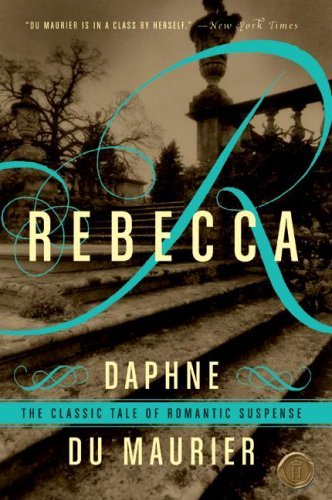- The Good: Well-crafted characters; fantastic buildup of tension; ominous atmosphere of Manderley
- The Bad: Not really a romance—the best relationship is between the two Mrs. de Winters
- The Literary: A dark and gothic literary treat
The young bride of a new husband, recently wedded but only having known her husband for a short time, moves into Manderley, an isolated gray stone mansion on the windswept Cornish coast. But the new Mrs. de Winter finds that her predecessor, the late, beautiful Rebecca still lives in the minds of everyone in the house, especially the devoted housekeeper Mrs. Danvers, who keeps Rebecca’s rooms exactly as they were the day she died.
There’s a lot to love about this story. The prose is beautiful and atmospheric. The plot builds slowly but surely. You immediately want to root for the narrator, and she serves as the window through which you discover the grand estate of Manderley and darkness within. The narrator is a young woman, 21 years old, and a paid companion to Mrs. Van Hoppers, a wealthy older woman who treats her poorly. When she meets the handsome, wealthy, and mysterious Maxim de Winter, she falls in love, and Maxim steals her away to his estate.
I love that the narrator is unnamed and remains so throughout the story. Mrs. Van Hoppers’ character establishes what class of people our narrator belongs to, that is, the lower working class. She’s cast aside and judged by many around her as weak of character, forgettable, and a charity case. It’s no surprise that when she arrives at Manderley that she’s seen as unworthy of Maxim de Winter and as lady of the famous estate. She’s referred to as Mrs. de Winter, which does not even give her an identity of her own, as it was once Rebecca’s.
After all, Rebecca had “breeding, brains, and beauty”. She was slim yet strong, had pale skin offset with dark hair. Rebecca cultivated her Manderley even down to the flowers, which were grown in perfect order to be cut and arranged just so. You get to know Rebecca especially through Mrs. Danvers, whose villainy is creeping and insidious, who worships her late mistress as the perfect woman, often talking about Rebecca as if she were alive and looking down. Mrs. Danvers is a fantastic literary antagonist.
The new Mrs. de Winter becomes convinced that Maxim regrets marrying her, and that he’s still deeply in love with the seemingly perfect Rebecca. Maxim won’t speak of her, and any mention of her causes him to disappear, sometimes for days at a time. The first half of the book is gothic and tortured, atmospheric and psychological. Du Maurier considered it a study in jealousy.
The turning point of the novel shifts the tone considerably. Maxim finally tell the new Mrs. de Winter his feelings about Rebecca and the details of her death. Instead of a the moody gothic emotionally-tortured story, the plot transforms into a suspenseful thriller. The new Mrs. de Winter finds some courage, and you want her to prevail, but at what cost? The story ends in some ambiguity—just enough that Rebecca may haunt you too.
Highly recommended for all fans of gothic literature!
